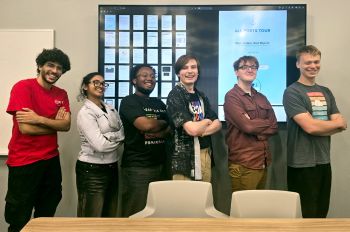Your Next Personal Nutritionist Could Be AI
Illinois Tech to Participate in Nationwide Study That Aims to Use Technology to Hone Dietary Intervention

Illinois Institute of Technology is one of 14 centers collaborating on a new nationwide nutrition study that will gather more data on human responses to different dietary interventions than any other in history. Researchers aim to combine biometric data collected from 10,000 individuals participating in this study with artificial intelligence and machine learning (ML) technologies to advance the development of personalized nutrition plans, or precision nutrition, a service that could eventually be made more widely available to health care practices.
The study, called the Nutrition for Precision Health (NPH) Program, is funded by the National Institutes of Health (NIH) and will build upon existing research available from NIH’s All of Us Research Program. NIH is awarding a combined total of $170 million to fund five years’ worth of research across the participating universities and research centers, which themselves are collaborating as smaller consortiums.
“This will be a landmark study of human variability in response to diet,” says Britt Burton-Freeman, a professor of food science and nutrition and the chair of the Department of Food Science and Nutrition, who is leading Illinois Tech’s involvement in the project.
“If we think about personalized medicine, this is personalized nutrition—providing the right diet for the right person at the right time,” Burton-Freeman says. “You can’t personalize [nutrition] if you don’t understand variation in humans. The data we collect across all centers will come from physical assessments and biospecimen collections so that genetics, gut microbes, and biological data can be combined with lifestyle, social, and environmental data to determine why people respond the way they do to different dietary regimens, and then use these data to develop algorithms that predict individual responses to foods and dietary patterns powered by ML.”
Illinois Tech is partnering with Northwestern University and the University of Chicago, and is receiving around $4.5 million to fund its own portion of the research over five years. The three universities together make up one of six clinical research centers across the country, and will be operating under a shared name, the Illinois Precision Nutrition Research (IPNR). The IPNR will be executing dietary interventions in the Chicago region with a combined total of $13 million in funding to carry out this research. The researchers are seeking as diverse a range of study participants as possible in terms of age, sex, race, genetics, geographic location, and more.
“Illinois Tech will be performing clinical research protocols in one-third of the 2,000 study participants on Mies Campus in our Clinical Nutrition Research Center, a division of the university’s Center for Nutrition Research,” says Burton-Freeman.
There are three modules to the dietary interventions, Burton-Freeman says.
“One is to assess the acute dynamic responses to a test meal and the variability relative to people’s usual diets over two occasions,” she says. “The second module is to take that same meal, the test meal, and this time test individual responses to the meal after changing people’s usual background diet. We’ll do this three times with three different diets for two weeks. The three diets will differ compositionally but not calorically. We will give study participants all the specific foods and drinks we want them to consume daily and to maintain their current body weight. In the third module, we repeat module two except people live with us for two weeks. Throughout the experiments we are collecting blood, urine, saliva, and stool samples along with performing a variety of other assessments for analysis.”
By having a portion of study participants live in designated housing for two weeks in the third module, the researchers can more fully control their habits.
“Behavioral and to some degree environmental aspects will be assessed in the third module,” Burton-Freeman says. “An objective of this part of the research is to determine what and how much changes in our assessment readouts by fully controlling what people eat and do, versus having them in their normal environment living their regular life.”
The first meeting of the 14 collaborating institutions will be held virtually on January 24 and 25. Burton-Freeman says the first year of collaboration will involve planning the exact course of research that will be conducted, including the specific diets and meals as well as the biomarkers that will be assessed in participants. The remaining four years of the study will be spent executing the plan.
All of Us and Nutrition for Precision Health, powered by the All of Us Research Program, are service marks of the United States Department of Health and Human Services. The Illinois Institute of Technology is a performance site on the Northwestern University award, grant number UG1 HD107697-01.
Photo: Professor of Food Science and Nutrition and Chair of the Department of Food Science and Nutrition Britt Burton-Freeman




